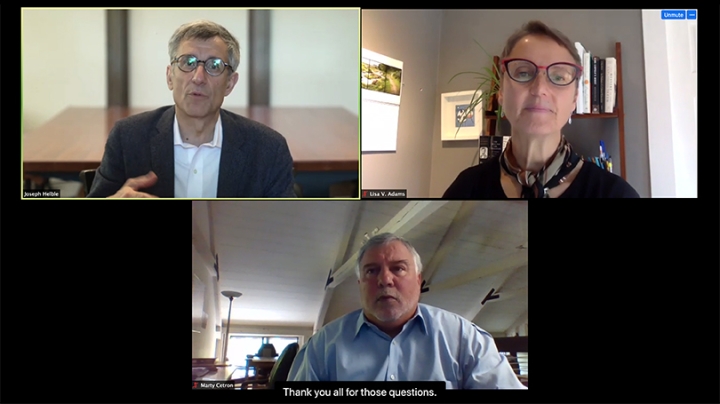“The Dartmouth strategy is very well thought out,” Martin Cetron ’81, director for the Division of Global Migration and Quarantine at the U.S. Centers for Disease Control and Prevention (CDC), said during Wednesday’s Community Conversations webcast, a live discussion about Dartmouth’s operations during the COVID-19 pandemic, hosted by Provost Joseph Helble.
Cetron, speaking as an alumnus and member of the board of visitors of the John Sloan Dickey Center for International Understanding and not as a representative of the CDC, was referring to Dartmouth’s plan to bring students back to campus beginning in September, which Helble and COVID-19 task force co-chair Lisa Adams discussed in detail during the broadcast.
Of the plan—which establishes a rigorous regimen of COVID-19 testing; mandates mask-wearing, social-distancing protocols, and other prevention protocols; and provides what Helble described as “intentional buffering capacity in the system” for students who need to be quarantined on campus—Cetron said, “It includes all three really critical pillars: prevention, detection, and response.”
These, he said, are “exactly the tools that would be needed” for any residential education plan to work.
And he expressed caution.
“Ultimately, success will depend on the civic responsibility and the cohesiveness of the community to recognize that what we do as individuals is an essential component of protecting this bubble of low virus transmission on campus and in the Upper Valley.”
Adams, MED ’90, the associate dean for global health and an associate professor of medicine at the Geisel School of Medicine, said that new testing protocols have already begun for arriving graduate and professional school students at Geisel, Tuck School of Business, and Guarini School of Graduate and Advanced Studies. (To date, no one has tested positive.)
She stressed the importance of rigorous testing and isolation in the first 14 days after students arrive in Hanover, which currently has little to no community transmission of the COVID-19 virus.
“We know that travel is a risk factor associated with COVID transmission, so the high-risk period for the virus to be introduced into our Upper Valley community is when there are newly arriving groups, in this case our students,” she said. “So being able act quickly and early to identify anyone who may have been infected, either in their home community before they left or during their travel to campus, is really critical.”
Helble, who began the broadcast by wearing a mask, a gesture meant to underline “the essentially important role” masks and other precautions will play in making residential life on campus possible, said that about 2,300 undergraduates are expected to be on campus for the fall term.
That number reflects everyone in the classes of 2022 and 2024 and all new transfer students who confirmed their interest in a residential fall term, according to the results of a survey sent to students from the offices of student affairs and institutional research. Ninety-six percent of all students have responded to the survey, Helble said.
Students will be assigned staggered arrival times over the six days before classes start and will be tested for COVID-19 on arrival and on their third and seventh days on campus. All students in residence will be expected to sign a statement of community expectations, agreeing to comply with Dartmouth’s social distancing and other prevention protocols.
For testing, Adams said Dartmouth plans to use FDA-approved anterior nares swabs, which take samples from the front of the nose, rather than the more uncomfortable nasopharyngeal swabs. She said she is hopeful that a self-administered test will be approved by the time students start to arrive.
In addition to testing, students will be expected to follow strict social isolation rules (with increasing flexibility according to their test results) during their first 14 days on campus, and to follow all safety protocols thereafter.
“I cannot stress enough to our entire community and particularly to students that this initial two-week period is essential to giving all our community confidence that we can manage this together,” said Helble.
“It is essential to assuring our community—including the greater Hanover community—that we are prepared for and can manage through successive terms here in Hanover until a vaccine is developed and deployed.”
Community Conversations is an online forum for Dartmouth community members to ask questions and learn from campus leaders about the institution’s priorities, decisions, and operations during the pandemic. The live discussions, produced by Dartmouth’s Media Production Group and the Office of Communications, air on selected Wednesdays at 3:30 p.m. The next webcast, which will feature Dean of the College Kathryn Lively, is scheduled for Aug. 19.
Past episodes are available on the Community Conversations site, which includes call-in numbers for those who want to listen to the show without video. Find out how to watch or listen to the live webcast.
For the most recent information on Dartmouth’s response to the pandemic, visit the COVID-19 website.
Hannah Silverstein can be reached at hannah.silverstein@dartmouth.edu.


